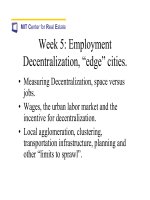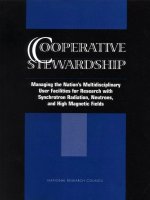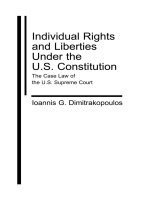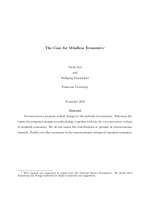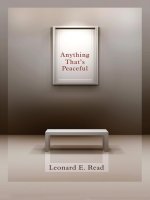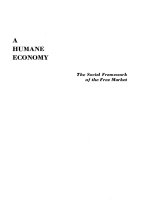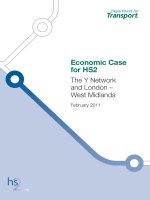Anything That’s Peaceful - The Case for the Free Market docx
Bạn đang xem bản rút gọn của tài liệu. Xem và tải ngay bản đầy đủ của tài liệu tại đây (9.48 MB, 256 trang )
ANYTHING
THAT'S
PEACEFULANYTHING
THAT'S
PEACEFUL
The
Case
for the Free Market
LEONARD
E.
READ
The
Foundation
for Economic
Education,
Inc.
Irvington-on-Hudson,
New
York 1964
THE
AUTHOR
AND
PUBLISHER
Leonard
E.
Read,
author
of Conscience
of
the
Majority~
Government-An
Ideal
Con-
cept~
Miracle
of
the
Market~
Students
of
Liberty~
Why
Not
Try
Freedom?~
Elements
of
Libertarian
Leadership~
and
other
books
and
articles, is
President
of
the
Foundation
for Economic
Education,
organized
in
1946.
The
Foundation
is
an
educational
cham-
pion
of
private
ownership,
the
free
market,
the
profit
and
loss system,
and
limited
government.
It
is
nonprofit
and
nonpoliti-
cal. Sample copies of
the
Foundation's
monthly
study
journal,
THE
FREEMAN,
are
available
on
request.
PUBLISHED
SEPTEMBER
1964
Copyright
1964, by
Leonard
E.
Read.
Permission to
reprint
granted
without
special request.
PRINTED
IN
U.S.A.
CONTENTS
Page
1.
A BREAK
WITH
PREVAILING
FAITH
1
Let
anyone
do
anything,
so
long
as his actions are
peaceful;
limit
government
to
keeping
the
peace.
The
author's
premise.
Incorruptibility
defined
and
its im-
portance
emphasized.
2.
THE
AMERICAN
SETTING:
PAST
AND
PRESENT
10
A review
of
our
evolutionary
past
should
help
us
to
better
cope
with
the
devolutionary
theories
and
prac-
tices
of
the
present.
3.
STRIFE
AS
A WAY
OF
LIFE
Socialism rests
on
raw
violence. Peaceful
people
rarely
carry
noncompliance
far
enough
to
discover this shock-
ing
fact
about
our
"social gains."
4.
SOCIALISM IS
NONCREATIVE
Socialism
only
gives
the
appearance
of
being
produc-
tive.
What
we
mistake
for socialism's
achievement
is
free
human
energy
pushing
its way
through
the
stifling
bureaucratic
regimentation.
vii
viii
ANYTHING
THAT'S
PEACEFUL
5.
HOW
SOCIALISM
HARMS
THE
INDIVIDUAL
When
the
individual
forsakes
or
has
taken
from
him
a sense of self-responsibility,
he
loses
the
very essence
of
his being.
6.
HOW
SOCIALISM
HARMS
THE
ECONOMY
72
Socialism gives rise to
unnatural
and
unmarketable
human
efforts
and
specialties, exchangeable only
under
duress.
If
this persists,
our
once
dynamic
economy
will
spin
apart!
7.
HOW
PRESSURE
GROUPS
PROMOTE
INFLATION
Labor
unions
cause inflation precisely as
do
chambers
of
commerce
and
all
other
groups
which seek
handouts
from
the
federal treasury; not, as is commonly sup-
posed, by way of price
and
wage "spirals."
8.
APPOINT
A
COMMITTEE!
8g
Committees
tend
to absolve
individuals
from personal
responsibility for positions taken,
thus
permitting
care-
less
and
irresponsible actions
which
seriously
threaten
the
peace.
g.
REGARDLESS
OF
CHOICE,
VOTE!
108
Voting
presupposes a choice. Citizens have
no
~oral
obligation
to cast a
ballot
for
the
"lesser
of
two
ev~ls,"
or
for
one
of
two trimmers;
trimming
is
not
compara
tive, since every
trimmer
is
without
integrity.
CONTENTS
10.
ON
KEEPING
THE
PEACE
ix
12
4
The
real
and
revealing
distinction
between
the
social-
ist,
on
the
one
hand,
and
the
student
of
liberty,
on
the
other,
is a difference
of
opinion
as to
what
peaceful
actions
others
should
be
prohibited
from
taking.
11.
ONLY
GOD
CAN
MAKE
A
TREE-
OR
A
PENCIL
Creative
human
energies
combine
miraculously to
form
a
jet
plane,
a symphony, a pencil,
just
as molecules
combine
to
form
a living tree.
12.
THE
MOST
IMPORTANT
DISCOVERY
IN
ECONOMICS
144
The
most
important
discovery
in
economic science may
be
stated
in
a simple sentence.
If
fully mastered,
it
is
all
the
economics
the
layman
needs to know.
13.
THE
GREATEST
COMPUTER
ON
EARTH
157
The
free
market
computer,
if
permitted
to operate, re-
quires
no
attendants.
and
its services
are
free.
It
can
automatically
receive billions
of
flowing
data
daily,
giving off simple signals
in
the
form
of
prices.
14.
BY
MIRACLE
Let
anyone deliver catalogues
and
letters as freely as we
are
permitted
to deliver freight
or
sound
or
human
beings.
An
explanation
of
why so
many
people
mis-
takenly believe
that
delivery
could
not
possibly
be left to
private
enterprise.
x
ANYTHING
THAT'S
PEACEFUL
15.
WHOSE ACADEMIC FREEDOM?
180
An
introduction
to
the
myths
surrounding
government
education,
and
how
these myths create a distressing
confusion over academic freedom.
16.
EDUCATION
FOR
THE
SAKE
OF
OTHERS
Government
education
is
predicated
on
one's
education
being
in
conformity
with
the
way others
think
he
should
be
educated.
An
explanation
of
how
coercion
in
education
creates
an
imbalance
between know-how
and
wisdom.
17.
EDUCATION
FOR
ONE'S
OWN
SAKE
208
Education
to
fit
the
individual;
in
short,
the
case for
the
free
market
in
education.
18.
IN
PURSUIT
OF
EXCELLENCE
222
The
good society will never emerge from
man's
drafting
boards. Instead,
it
is a
dividend
flowing from
the
presence,
in
the
pink
of
condition~
of
a
natural
aris-
tocracy of
virtue
and
talents
among
men.
INDEX
239
Many
favor peace
but
not
many
favor
the
things
that
make
for peace.
-THOMAS
A KEMPIS
CHAPTER
1 •
A
BREAK
WITH
PREVAILING
FAITH
GALl
LEO
WAS
CALLED
on
the carpet,
tried
by
the
Inquisition,
and
put
in
prison
because
he
affirmed
the
theory
of
Co-
pernicus
that
the
solar system does
not
revolve
around
our
earth.
The
tru
th
as
he
perceived
it
was a
break
wi
th
the
prevailing faith;
he
committed
the
unpardonable
sin of
affronting the mores.
This
was his guilt.
Americans-enlightened
as we suppose ourselves to
be-
are inclined to view
with
scorn
that
illiberal
attitude
of
some three centuries ago which sought
to
keep the
light
of
new evidence away from the fallacies of
that
time. Fie
on
such childish intolerance;
we
are
not
afraid
of
truth;
let
the
light
shine in!
Perhaps
we
should
pause for a
moment
and
carefully
scrutinize
what
our
own
mirror
reveals. A
letter
in
the
morning
highlights my
point:
this
woman
had
visited
the
librarian
of the
high
school to which she
had
made
a gift
of
The
Free1nan, a
monthly
journal
that
presents, dispas-
sionately
but
consistently, the
rationale
of
the
free
market,
private
property,
limited
government
philosophy, along
2
ANYTHING
THAT'S
PEACEFUL
with
its
moral
and
spiritual
antecedents. She discovered
that
the
journal
was
not
among
the
periodicals displayed
for
student
perusal,
that
it
had
been
discreetly relegated to
the
teachers'
reading
room.
What
was
the
reason for this
under-the-rug procedure?
The
librarian
explained,
liThe
Freeman is too conservative." My correspondent,
distraught
by this illiberal
attitude-by
this
attempt
to keep
students
from
knowing
about
the
freedom
philosophy-asked
of
me,
"What
can
we
do
about
this?"
The
answer to this
question
is to
be
found
in
an
old
English proverb,
"Truth
will
out!"
As
it
did
with
Galileo's
theory, so
it
will
do
with
the ideology
of
freedom! However,
if
we
would
conserve
our
energies
and
act
in
the
best
interests
of
the
freedom philosophy, we will
do
well to re-
flect
on
the
most effective way to
lend
a
hand
to
the
phi-
losophy. Suppose, for instance, Galileo
had
exerted
pres-
sure
on
the
Inquisitors
to purvey
that
fragment
of
truth
he
had
come
upon.
The
folly
of
such a tactic is clear:
His
truth
in
the
hands
of
his enemies; heaven forbid! Likewise,
it
is folly for us to
exert
influence
on
those of
the
collectiv-
istic
faith-be
they librarians, teachers,
book
reviewers
or
bookstore owners, politicians,
or
whoever-to
carry
the
mes-
sage
of
individuality
and
its essential concomitant, freedom
in
exchange.
If
one
wishes to win, never choose team-
mates
who
are
intent
on
losing
the
contest.
Indeed,
such
folks
should
be
scrupulously avoided as partners.
The
way to give
truth
a
hand
is to
pursue
a do-it-your-
self policy. Each
must
do
his
own
seeking
and
revealing.
Such success
as
one
experiences will uncover
and
attract
all
the
useful, helpful, sympathetic teammates one's
pursuit
A
BREAK
WITH
PREVAILING
FAITH
3
deserves.
This
appears
to
be
truth's
obstacle
course-no
short
cu
ts
allowed.
A
Dark
Age is followed by
an
Enlightenment;
devolution
and
evolution
follow
on
each
other's
heels;
myth
and
truth
have
each
their
day,
now
as ever.
These
opposites-action
and
reaction-occur
with
the
near
regularity
of a
pendu-
lum,
here
as elsewhere,
the
vaunted
"common
sense of
the
American
people"
notwithstanding.
The Faith in Collectivism
Our
time, as
did
Galileo's, witnesses
an
enormous
intol-
erance
toward
ideas
which
challenge
the
prevailing
faith,
that
faith
today
being
collectivism-world-wide.
Americans
during
the
past
three
or
four
decades have swung over-
whelmingly
toward
the
myths
implicit
in
statism;
but,
more
than
this, they have become actually antagonistic to,
and
afraid
of
identification with, free
market,
private
property,
limited
government
principles.
Indeed,
'such
is
tne
impact
of
the
collectivistic myth, they shy away from
any
idea
or
person
or
institution
which
the
political welfarists
and
planners
choose
to
label as "rightists." I have
labored
full
time
in
this controversy for
more
than
thirty
years
and,
having
a
good
memory, these shifts are as clear to
me
as
if
they
had
occurred
in
the
last few moments,
or
I'd
just
viewed
a time-lapse movie of these events.
Were
I
unaware
that
such actions
and
reactions are
inevitable
in
the
scheme of
things-particularly
when
observing such
behavior
by busi-
nessmen as well as by teachers, clergymen,
and
labor
offi-
cials-I
would
be
unable
to
believe my eyes.
4
ANYTHING
THAT'S
PEACEFUL
Yet,
truth
will out!
While
myth
and
truth
contend
in
their
never-ending fray, trl;1th inches
ahead
over
the
mil-
lennia
.as
might
be
expected
from
the
evolutionary
process.
My
faith
says
that
this is
ordained,
if we be worthy, for
what
meaning
can
truth
have
except
our
individual
per-
ception
of
it?
This
is to say
that
among
the
numerous
im-
peratives
of
truth
is
that
many
individuals
do
their
utmost
in
searching for
it
and
reporting
whatever
their
search re-
veals.
Worthiness
also
requires
of
those
who
would
don
her
mantle
a
quality
of
character
which
I shall call
incorrupti-
bility.
The
more
individuals
in
whom
this
quality
finds
refinement
the
better,
and
the
sooner
more
truth
will
out.
This
quality
is
too
important
to suffer neglect for brevity's
sake; so
let
me
spell
it
out.
If
my
claim for
incorruptibility
is
to
hold
water,
the
no-
tion
of
corruption
will
have
to
be
refined
beyond
its gen-
erally accepted identification
with
bribery, stealing, bold-
faced lying,
and
the
like.
Deplorable
as
are
these specimens,
they wreak
but
minor
havoc
compared
to
the
more
subtle
corruptions
of
the
intellect
and
the
soul which,
unfortu-
nately,
are
rarely
thought
of-or
even
felt-as
corruption.
The
level
of
corruption
I wish to
examine
was suggested
to
me
by a friend's
honest
confession,
"I
am
as
much
cor-
rupted
by my loves as by
my
hates." Few
of
us have suc-
ceeded
in
rising above this weakness;
indeed,
it
is
difficult
to
find one
who
has.
Where
is
the
individual
who
has so
freed himself
from
his affections for
or
prejudices against
persons, parties, creeds
that
he
can
utterly
disregard these
passions
and
weigh
each
and
every
act
or
proposal
or
idea
A BREAK
WITH
PREVAILING
FAITH
5
strictly
on
its
own
merits-as
if
he
were
unaware
of its
source?
Where
is
the
man
who
can
say "yes"
or
"no"
to
friend
or
foe
with
equal
detachment?
So
rare
are
such
in-
dividuals
that
we
run
the
risk of
concluding
that
no
such
person
exists.
However, we
mu~t
not
despair. Recently, I was
presented
with
an
idea
by
an
unknown
author-in
these words:
.
UT
here
is
no
such
thing
as
a broken
commitment."
Observ-
ing
on
many
occasions
that
people
do
actually
go
back
on
their
bond,
I
thought
this
to
be
at
odds
with
the
facts of
life.
Later,
its
meaning
was
explained
to me:
An
unbroken
commitment
in
this
context
means
something
more
than
paying
debts,
keeping
promises, observing contracts. A
man
has a
commitment
to his own conscience, that is, to
truth
as
his highest conscience discerns
truth,
and
every word
and
deed
must
be an accurate reflection thereof.
No
pressure
of
fame
or
fortune
or
love
or
hate
can
even
tempt
such a
person
to compromise his integrity.
At
this level of life
there
can
be
no
broken
commitment.
Incorruptibility
in
its
intellectual
and
spiritual
sense
refers to a ·higher
order
of
men
than
is generally
known
to
exist.
It
relates to
men
whose
moral
nature
is such
that
in-
fidelity to conscience is as
unthinkable
to
them
as stealing
pennies from a child's
bank
is
to us. Folks
who
would
de-
viate from
their
own
highest concept
of
righteousness simply
are
not
of this
order
nor
are
they likely to
be
aware
that
there
is
such
an
order
of men.
An
interesting
sidelight
on
the
individual
whose
prime
engagement
is
with
his
own
conscience
and
who
is
not
swerved
by
popular
acclaim
or
the
lack
of
it, is
that
he
6
ANYTHING
THAT'S
PEACEFUL
seldom knows
who
his
incorruptible
brothers
are.
They
are,
by
their
nature-all
of
them-a
quiet
lot; indeed, most
of
us are lucky
if
we ever
spot
one.
Signs
of
Corruption
At
this
moment
in
history, this
order
of
men
must
be
dis-
tressingly small.
The
reason for this
opinion
is
the
"re-
spectability" which presently
attends
all
but
the
basest forms
of
corruption.
Almost
no
shame descends
upon
seekers
after
office
who
peddle
pure
hokum
in
exchange for votes;
they sell
their
souls for
poli
tical
power
and
become
the
darlings
of
the
very people
on
whom
their
wiles are prac-
ticed. Business
and
professional
men
and
women, farmers
and
workers,
through
their
associations
and
lobbies, clergy-
men
from
their
pulpits,
and
teachers before
their
students
shamelessly advocate special privileges:
the
feathering
of
the nests
of
some
at
the
expense
of
others-and
by coer-
cion!
For
so
doing
they receive
far
more
pious acclaim
than
censure. Such are
the
signs of widespread
corruption.
As
further
evidence of intellectual
corruption,
reflect
on
the growing
extent
to
which
excuses are advanced
as
if
they
were reasons.
In
the
politico-economic realm, for example,
we
put
an
embargo
on
goods from
China
because they are,
in
fact, competitive.
But
professing to favor free, competi-
tive enterprise,
and
hesitating
to
confess
that
we are against
competition, we
corrupt
ourselves
and
offer
the
excuse
that
these goods are
"red."
Caviar
from
Russia-noncompetitive-is
imported
by
the
ton
but
is
just
as
Clred"
as a
linen
tablecloth
from
A BREAK
WITH
PREVAILING
FAITH
7
China.
This
type of
corruption
occurs
on
an
enormous
scale,
but
is
shrugged
off as "good business."
Things
would
be otherwise
if
incorruptibility
were
more
common.
If
I
am
not
mistaken, several rare,
incorruptible
oversouls
have passed my way
during
these last
three
decades.
For
one
thing, they were different.
But
it
cannot
be
said
that
they stood
out
from
the
rest of us for,
to
borrow
a
phrase
from a Chinese sage, they all
operated
in
"creative quiet-
ness."
While
not
standing
out,
they were
outstanding-that
is,
their
positions were always
dictated
by
what
they be-
lieved to
be
right.
This
was
their
integrity.
They
consistent-
ly, everlastingly
sought
for
the
right.
This
was
their
in-
telligence.
Furthermor~,
their
integrity
and
intelligence im-
parted
to
them
a wisdom few ever
attain:
a sense of
being
men,
not
gods,
and,
as
a consequence,
an
awareness
of
their
inability
to
run
the
lives of others.
This
was
their
humility.
Lastly, they never
did
to
others
that
which
they
would
not
have
others
do
to them.
This
was
their
justice.
Truth
will
out,
with
enough
of
these
incorruptible
souls!
The Truth About Freedom
Now,
having
staked
out
the
ideal,
it
behooves
me
to
ap-
proximate
it
as best I can,
which
is
to say, to
present
the
truth
as I see it,
in
this instance, as
it
bears
on
the
free
market
and
related
institutions.
By my title,
"Anything
That's
Peaceful," I
mean
let
any-
one
do
anything
he
pleases
that's
peaceful
or
creative;
let
there
be
no
organized
restraint
against
anything
but
fraud,
violence, misrepresentation,
predation;
let
anyone
deliver
8
ANYTHING THAT'S PEACEFUL
or
educate
or
preach his religion
or
whatever, so long
as
it's peaceful;
limit
society's agency
of
organized
force-
government-to
juridical
and
policing functions,
tabulating
the do-nots
and
prescribing the penalties against unpeace-
ful actions;
let
the government
do
this
and
leave all else
to the free,
unfettered
market!
All of this, I concede,
is
an
affront to the mores.
So
be it!
One
more point: Discussion of ideological questions is
more
or
less idle unless there be
an
awareness
of
what
the
major
premise
is.
At
what
is the
writer
aiming? Is
he
doing
his reasoning
with
some purpose
in
mind?
If
so,
what
is it?
I
do
not
wish to leave anyone
in
the
dark
concerning my
basic
point
of reference. Realizing years ago
that
I
couidn't
possibly be consistent
in
my positions unless I reasoned
from a basic
premise-fundamental
point
of
reference-
I set
about
it
by asking one
of
the most difficult of ques-
tions:
What
is man's earthly purpose?
I could find
no
answer to
that
question
without
bump-
ing,
head
on,
into
three
of
my basic assumptions.
The
first
derives from the observation
that
man
did
not
create him-
self, for there
is
evidence aplenty
that
man
knows very little
about
himself, thus:
I.
The
primacy
and
supremacy
of
an
Infinite
Consciousness;
2.
The
expansibility
of
individual
consciousness, this
being
demonstrably
possible;
and
3.
The
immortality
of
the
individual
spirit
or
consciousness,
our
earthly
moments
being
not
all there is to
it-this
being
something
I
know
but
know
not
how to demonstrate.
With
these assumptions, the answer to the question,
"What
is man's earthly purpose?" comes clear:
It
is to ex-
A BREAK
WITH
PREVAILING
FAITH
9
pand
one's
own
consciousness
into
as near a
harmony
with
Infinite
Consciousness
as
is
within
the power
of
each~
or~
in
more lay
terms~
to see how nearly one can come to a
realization
of
those creative potentialities peculiar to one's
own
person~
each
of
us being different
in
this respect.
This
is my
major
premise
with
which
the
reader
mayor
may
not
agree
but
he
can,
at
least, decide for himself
whether
or
not
the following chapters are reasoned logical-
ly from this basic
point
of
reference.
The
ideas offered
here
have
been
brewing
for several
years.
Many
of them,
though
slightly rephrased, have ap-
peared
elsewhere as separate essays. My
aim
now
is to gath-
er
those fragments
into
an
integrated, free
market
theme.
•
CHAPTER
2 •
THE
AMERICAN
SETTING:
PAST
AND
PRESENT
SOMEONE
ONCE
SAID:
It
isn't
that
Christianity has been tried
and
found
wanting;
it
has
been
tried
and
found
difficult-
and
abandoned. Perhaps the same
running
away from
righteousness
is
responsible for freedom's
plight
for, plain-
ly, the American people are becoming more
and
more afraid
of
and
are
running
away
from-abandoning-their
very
own freedom revolution.
Freedom,
it
seems to me, is of two
broad
types, psycholo-
gical
and
sociological.
The
psychological-perhaps
the more
important
of the two,
but
not
the
major
concern of this
book-has
to
do
with
man
freeing himself from his own
superstitions, myths, fears, imperfections, ignorance.
This,
of course, is a never-ending task to which we should give a
high
priority.
The
sociological aspect of freedom,
on
the
other
hand,
has to
do
with
man
imposing his will by force
on
other
men.
It
is
unfortunate
that
we need to spend any time
on
this
part
of the problem, for
it
calls for combating a
situation
that
should
not
be.
For
instance,
it
is absurd for me forcibly
to impose my will
upon
you: dictate
what
you are to dis-
10
THE
AMERICAN
SE'ITING:
PAST
AND
PRESENT
11
cover, invent, create,
where
you shall work,
the
hours
of
your
labor,
the
wage you shall receive,
what
and
with
whom
you shall exchange.
And
it
is
just
as
absurd
for any two
or
even millions
or
any agency
that
the
millions
may
con-
trive-government
or
otherwise-to
try to forcibly
direct
and
control
your
creative
or
productive
or
peaceful actions.
Light
can
be
shed
on
this
thought
by reflecting
on
the
manner
in
which
human
energy manifests itself. Broadly
speaking,
it
shows
forth
as
either
peaceful
or
unpeace£ul,
which
is
to
say, as creative
or
destructive.
If
my
hand
is
used to
paint
a
picture,
write
this book,
build
a home,
strew seed, my energy
is
manifestly peaceful, creative, pro-
ductive.
But
if
I
make
a clenched fist of
the
same
hand
and
strike you
with
it, my energy is manifestly unpeaceful, de-
structive.
My
theme
is
that
anyone
of
us has a
moral
right
to in-
hibit
the
destructive actions of
another
or
others,
and,
by
the
same token, we have a
right
to organize (government)
to accomplish this universal
right
to life, livelihood, liberty.
But
no
living
person
or
any
combination
of persons, re-
gardless of
how
organized, has a
moral
right
forcibly
to
direct
and
control
the
peaceful, creative,
productive
ac-
tions of
another
or
others.
To
repeat, we
should
not
find
it
necessary to devote time
and
thought
to this sociological
aspect
of
the
freedom
problem,
but
a
brief
sketch
of
the
American
setting,
past
and
present, will
demonstrate
that
an
awakening
is
now
"a
must"
of
the
first order.
Let
us
pick
up
the
thread
of
the
historical
setting
be-
ginning
with
the
year
1620
when
our
Pilgrim
Fathers
landed
at
Plymouth
Rock.
That
little
colony
began
by
12
ANYTHING
THAT'S
PEACEFUL
praCtICIng communism; all
that
was
produced
by
each
member, regardless of
how
much
or
how
little, was forced
(unpeaceful)
into
a common warehouse
and
the
proceeds
of the warehouse were doled
out
in
accord
with
the gov-
erning
body's
idea
of
the
need.
In
short,
our
Pilgrim Fath-
ers began the practice
of
a
principle
that
was advanced by
Karl
Marx-more
than
two centuries
later-as
the
ideal of
the
Communist
Party:
"from
each according- to his ability,
to each according to his need."
There
was a persuasive reason why the Pilgrims threw
overboard this communalistic
or
communistic practice: the
members were starving
and
dying because,
when
people are
organized
in
this
manner,
the warehouse always
runs
out
of provender.
The
stark reality of
the
situation
suggested
to
them
that
their
theory was wrong and, bless them, they
paused for reflection.
In
the
third
winter
when
they
met
with
Governor Bradford,
he
said to them,
in
effect: Come
spring, we'll try a new idea.
We'll
cast aside this communis-
tic
notion
of to each according to need
and
try the idea
of to each according to merit. Come spring,
and
each of
you shall have
what
each produces.
As
the record has it, springtime witnessed
not
only fath-
er
in
the
field
but
mother
and
the
children
as
well. Gov-
ernor
Bradford
reported
much
later, "Any generall
wante
or
famine
hath
not
been
amongst
them
since to this day."1
It
was by reason of the practice of this private
property
principle
that
there began
in
this
land
of ours
an
era
of
1
Taken
from Bradford's History tlof
Plimoth
Plantation"
from
the
original manuscript.
Printed
under
the
direction
of
the
Secretary of
the
Commonwealth
by
order
of
the
General
Court
(Boston:
Wright
&
Potter
Printing
Company, State
Printers,
18g8), p. 162.
THE
AMERICAN
SETtiNG:
PAST
AND
PRESENT
growth
and
development
which sooner
or
later
had
to
lead
to revolutionary political ideas.
And
it
did
lead
to
what
I
refer to as
the
real American revolution,
the
revolution
from
which
more
and
more
Americans are now
running
away,
as
if
in
fear.
A Revolutionary Concept
The
real American revolution, however, was
not
the
armed
conflict we
had
with
King George
III.
That
was a
reasonably
minor
fracas as such fracases go!
The
real
revolution was a novel concept
or
idea which was a
break
with
all political history.
It
was something politically new
on
earthl
Until
1776
men
had
been
contesting
with
each
other-
killing each
other
by
the
millions-over
the age-old ques-
tion
of which of the
numerous
forms of
authoritarianism
-that
is, man-made
authorities-should
preside
as
sov-
ereign over
man.
The
argument
was
not
which was better,
freedom
or
authoritar,ianism,
but
which
of
the
several forms
of
authoritarianism
was
the
least bad.
And
then,
in
1776,
in
the fraction of
one
sentence
written
into
the
Declaration
of Independence, was
stated
the
real American revolution,
the
new idea,
and
it
was this:
"that
all
men
are en-
dowed by
their
Creator
with
certain
unalienable
Rights;
that
among
these are Life,
Liberty
and
the
pursuit
of
Hap-
piness."
There
you have it!
This
is
the
essence of
the
orig-
inal
American
setting
and
the rock
on
which
the
"Amer-
ican miracle" was founded.
The
revolutionary
idea
was
at
once a
spiritual,
a political,
ANYTHING
THAT'S
PEACEFUL
and
an
economic concept.
It
was
spiritual
in
that
the
writ-
ers
of
the
Declaration
recognized
and
publicly
proclaimed
that
the
Creator
was
the
endower
of
man's
rights;
and,
thus,
it
follows,
that
the
Creator
is sovereign.
It
was political
in
that
it
implicitly
denied
that
the
state
is
the
endower
of
man's
rights,
thus
holding
to
the
tenet
that
the
state
is
not
sovereign.
Our
revolutionary
concept was economic
in
this sense:
that
if
an
individual
has a
right
to his life,
it
follows
that
he
has a
right
to
sustain
his
life-the
sustenance
of
life
being
nothing
more
nor
less
than
the
fruits of one's labor.
It
is
one
thing
intellectually to
embrace
such
a revolu-
tionary
concept as this;
it
is
quite
another
matter
to imple-
ment
it-to
put
it
into
practice.
The
implementation
came
in
the
form
of
two political
instruments-the
Constitution
and
the
Bill of Rights.
These
were essentially a series
of
pro-
hibitions-prohibitions
not
against
the
people
but
against
the
political
arrangement
the
people, from
their
Old
World
experience,
had
learned
to fear, namely, over-extended gov-
ernment.
2
The
Constitution
and
the
Bill of
Rights
more
severely
limited
government
than
government
had
ever before
been
limited.
There
were benefits
that
flowed from this limita-
tion
of
the
state.
The
first benefit, once this
new
concept became effective,
was
that
individuals
did
not
turn
to
government
for secur-
ity, welfare,
or
prosperity
because
government
was
SQ
lim-
ited
that
it
had
little
on
hand
to
dispense;
nor
did
its lim-
2
The
Constitution
and
the
Bill
of
Rights
specify 46 negations
of
governmental
actions.
